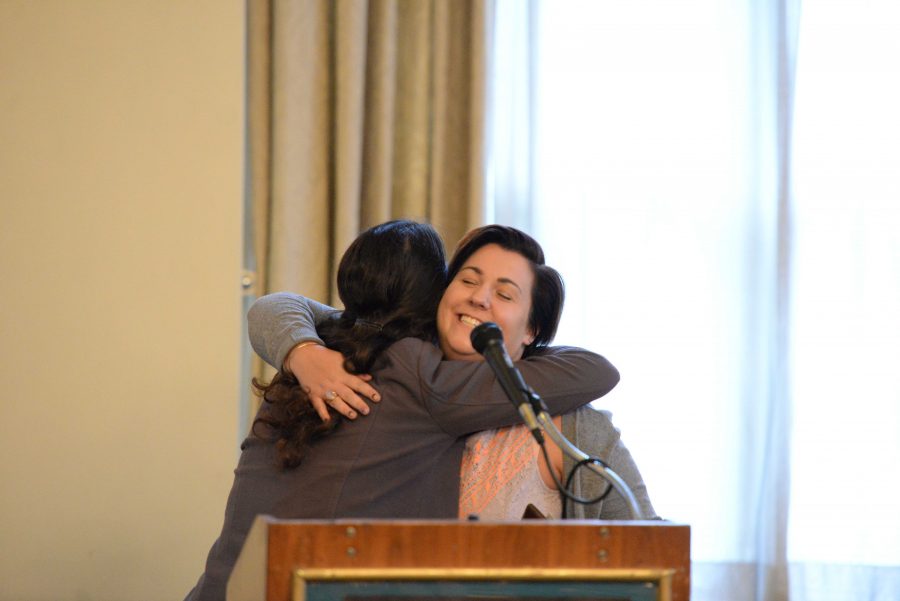For Robin Clarke, it’s the little work that can make the biggest difference.
On Thursday, the gender, sexuality and women’s studies program at Pitt recognized Clarke for her social activism in Braddock and East Liberty with a 2015 Iris Marion Young Award.
Clarke has been active in the fight to save Braddock Hospital, and was also part of a movement against gentrification in East Liberty.
“Validating the work that goes unseen helps me feel like what I’m doing has been recognized,” Clarke said.
Along with Clarke, a nontenure track faculty member in Pitt’s English department, Abby Yochum, a third-year, joint-degree student in the School of Law and the School of Social Work, and Marko Gudic, a senior at Pitt majoring in politics, philosophy and economics, were also the recipients of the 2015 Iris Marion Young Award.
The award recognizes politically active members of the Pitt community whose work, like Clarke’s, has had an impact at Pitt and in the Pittsburgh community.
The winners each received a monetary prize funded by the gender studies and women’s studies program. Anyone can nominate a member of the Pitt community for the award. The nominees then submit files detailing their work and political engagement, and the committee, made up of GSWS faculty, decides on the recipients.
Sheltered from the rain Thursday evening, a crowd of nearly 30 people gathered at 4 p.m. in the ballroom of the Pittsburgh Athletic Association for the awards ceremony and a panel discussion called Gender-Based Violence: Criminalization and Justice.
Pitt’s Graduate School of Public and International Affairs and the Women’s Studies Program inaugurated the Iris Marion Young Award in 2008, in memory of Young, a GSPIA professor in the 1990’s who died of cancer in 2006. Young was well-known for her writings on social justice, especially concerning gender and sexuality.
Yochum, in her brief remarks after accepting the award, spoke of a responsibility to justice. Often there is a temptation to give in to pessimism about progess, but justice — she emphasized — is a lifelong responsibility.
This theme carried over to the panel discussion on gender-based violence. When choosing the discussion’s focus, the committee tried to find a current topic that would engage the community as a whole.
The panel — moderated by Valerie Jenness, currently a senior visiting scholar at the Institute for Research on Women and Gender at the University of Michigan — included Jasmine Gonzales Rose, the assistant professor of law at the University of Pittsburgh, Julia Johnson, a community organizer with New Voices Pittsburgh, and Sarah Pesi, a senior at Chatham University.
Jenness introduced the panel discussion by drawing upon her many years in activism and education, emphasizing the need to translate the academic work to a message that could reach all necessary people
“Activism is taking a hard look and bringing the best of what we can do to the worst of problems and inequalities,” Jenness said.
Gudic asked those gathered to find ways to keep the community forums alive. A big part of solving the problems requires a constant engagement with the community, according to Gudic. He said just because an initiative is started, does not mean that it will produce results.
“I’m asking, no, begging you guys to make sure the forums remain a way for the community’s voice to be heard, not just some government show,” he said.


